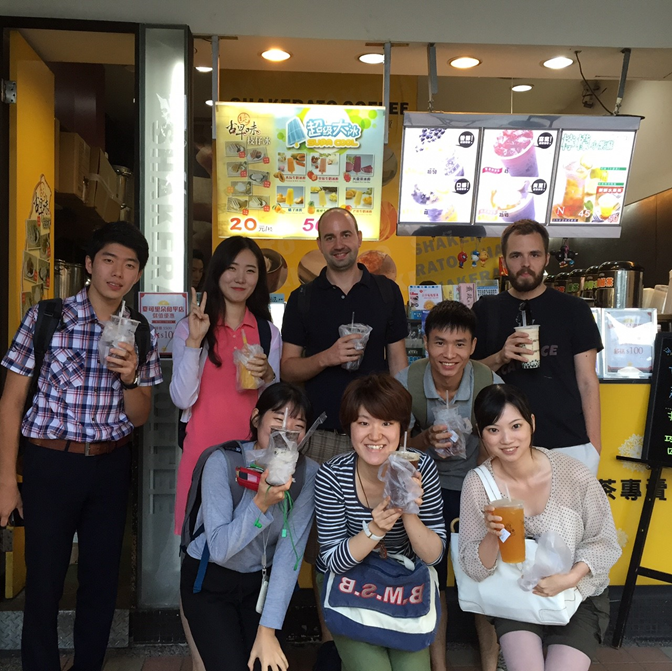My semester of language learning in Taiwan

Before choosing a university, I basically considered three universities located in Taipei: National Taiwan University (NTU), National Taiwan Normal University (NTNU), and the Mandarin Learning Center (MLC) of the Chinese Culture University (文化大學). All are located in the center of Taipei and they basically use the same textbook (Practical Audio-Visual Chinese). I decided to apply after receiving the notification about being nominated for the scholarship. However, at the time of being notified, NTU's classes were already full. Therefore, I would recommend applying as early as possible, especially if you plan to go for NTU. Moreover, you do not need to pay the tuition fee right away. In my case, I finally decided to study at MLC. It seemed to me that MCL has very modern facilities, focuses on conversational teaching, and usually has fewer Western students. This all turned out to be true and I really enjoyed studying Chinese there. Here are some personal impressions about MLC:
As I already mentioned above, the location of MLC is very central. In particular, it is next to the biggest park in Taipei, called Daan Park (大安森林公園). The location is very good and it is easily reachable by bus and subway. There is no high density of restaurants around the language center, but there are still some good ones nearby. Furthermore, there is also a small canteen in the library which provides good snacks. The library itself is modern and provides enough space to do homework and study. You also can reserve separate rooms to hold meetings with other students. In addition to that, the library provides computers to do further research on the internet. Half of those computers are up-to-date modern ones; the other half are too old to use well. However, the university also provides WIFI within the whole building. Classrooms are generally big and have modern equipment, but the tables and chairs are quite small in some classrooms.
The tuition fee at MLC is a bit lower than the fees at NTU and NTNU. Textbooks are not included but they can be bought at a lower price in the office (I do not know particular details about NTU and NTNU to compare appropriately). Additional small services fees might also occur when printing transcripts or other notifications. Last but not least, every student can join in trips to some interesting places which do not cost much at all. Joining in such trips is a great opportunity to get in touch with students from other classes.
For the most part, what I enjoyed was attending Chinese classes itself. When studying level 1 to 3, students can choose between morning and afternoon classes. During my six-month stay, I attended two classes (level 2 and 3). Both classes were given by different teachers. My first teacher was quite young and I liked her teaching style a lot. It was a well-balanced combination of teacher-centered teaching, and conversations. All the students were frequently selected and supposed to answer using new grammar items. It helped me a lot to improve my speaking skills. Although the overall teaching content was given by the textbook, the teacher provided a lot of additional material. Moreover, we also needed to present some small topics, do group work, and take about three tests a week. Two of them involved dictating a few vocabulary items and sentences only. The third one was a bigger test about grammar. It might sound like a lot but it was definitely feasible and I had fun attending the class. Moreover, the second level is very essential regarding basic grammar. In sum, I liked the teaching pace and my class mates who consisted of another European, three Koreans, two Japanese, and one Vietnamese student (see photo).
The class for level 3 was very different and also helped me a lot to improve my Chinese skills. The teaching style was slightly different and focused on teacher-centered teaching and free speech to improve pronunciation and speaking skill. For that, at the very beginning of every class, each student was supposed to read some sentences while using a microphone to practice hitting the right tones. In one term (3 months) we just finished one half of the 3rd textbook, so the pace is not that fast. This enables the teacher to provide a lot of additional and useful material. Therefore, one main part of the teaching content was learning a lot of new vocabulary. Our teacher provided and explained us many new words. Moreover, we often worked on particular topics and presented our way of thinking to other students. In addition to the textbook, every student had a notebook for writing homework and articles. We could write as much as we wanted to and our teacher corrected it once a week. In that class, I was the only westerner and all the other students were Koreans and Japanese. That was very interesting to me and we only used Chinese to communicate with each other.
The final exams of every semester examine listening, speaking, reading, and writing skills and take about an hour and a half. In sum, I really enjoyed studying Chinese at MLC and I would recommend studying there. Especially if somebody wants to focus on listening and speaking skills. It didn't make me feel tired of learning Chinese and even motivated me to continue studying it.
Last but not least, I want to thank the Education Division in Vienna and the Taiwanese Ministry of Education for providing such a great chance to study Chinese and learn more about Taiwanese culture. Taiwan is a great place and I will never forget my stay there.
